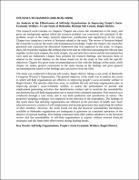| dc.description.abstract | OSUNDWA MUHAMMED (2008-MO92-20096)
An Analysis of the Effectiveness of Self-help Organisations in Improving People’s Socio-Economic Welfare: A Case Study of Hukeseho, Buyinja Sub-County, Bugiri District.
This research work contains six chapters. Chapter one covers the introduction to the study, and gives the background against which the research problem was conceived, the statement of the problem, scope of the study, research objectives, justification and significance of the study. Chapter two comprises a review of literature related to the study. The review of literature helped the researcher to pursue the study with foundational knowledge. Under this chapter, the researcher presented and explained the theoretical framework that was employed in the study. In chapter three, the researcher explains the methods that were used in collection and putting the relevant data together. In this same chapter, the study sample, size and selection criteria and the instruments that were used are elaborated. Chapter four presents the research findings, and discusses them in relation to the current debates on the issues found out by the study in line with the specific objectives. Chapter five gives some recommendations in line with the findings of this study, while chapter six makes general conclusions to the study basing on the findings and gives general recommendations based on the findings and conclusions from the field.
The study was conducted in Buyinja sub-county, Bugiri district, taking a case study of Hukeseho Lwangosia Women‟s Organisation. The general objective of the study was to analyse the extent to which self-help organisations are effective in improving people‟s socio-economic welfare in Bugiri district. The specific objectives were; to establish the role self-help organisations play in improving people‟s socio-economic welfare, to assess the performance of income and employment generating activities that beneficiaries conduct and to ascertain the sustainability mechanisms that self-help organisations use to ensure their continued operation. This research was conducted through a case study, and it was both qualitative and quantitative in nature. The purposive sampling technique was employed in the selection of the respondents. The findings of this study show that self-help organisations are effective in the provision of health care, basic education services, creation of self-employment and income generation thus improving the welfare of their members. However, the study found out that the financial sustainability mechanisms available to Hukeseho organisation are inadequate to guarantee its continued operations in the absence of external funding. This finding confirmed what other authors alluded to in the literature review that the sustainability of self-help organisations is suspect without external financial assistance and this limits their effectiveness during funding breaks.
Key Words: Self-help Organisations, People’s Socio-Economic Welfare, Bugiri District. | en_US |


